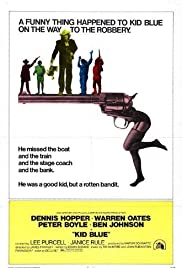
KID BLUE
US, 1973, 100 minutes, Colour.
Dennis Hopper, Warren Oates, Peter Boyle, Ben Johnson, Lee Purcell, Janice Rule.
Directed by James Frawley.
Kid Blue is emphatically NOT a Western. Kid Blue is one of those 1972-3 goofy satirical send-ups of pretentious American traditions - like Steelyard Blues and the enjoyable Slither. Kid Blue, a young foiled train-robber, tries to settle in a typical 1890s Western (rising industrial) town and falls foul of everyone (and everyone stands for typical US tradition - the West, progress, industry, the law religion, morals). What else in such a society but to go back to robbery? Dennis Hopper is a successfully naive Kid Blue, Warren Oates, Peter Boyle, Ben Johnson, Lee Purcell and Janice Rule are on hand to complicate his life. Successfully droll satire, but only for those who like it.
1. What were the opening expectations from the film? A Panavision western? A robbery western? The man falling off the train and hurting his leg? What happened then as regards your response?
2. How successful a satire on American conditions was this film? Was it too particularly American for overseas consumption? Why?
3. The personality of Kid Blue, his lack of success as a robber? What comment on Western criminals did this make? Kid Blue as Bickford? As a young man who tried to settle down in life? What kind of a man was Bick? How did he find his place in the West? What kind of American was he? How naive a young nun of the 19th century was he? How then could he be a symbol for the naive and innocent young man trying to make his way in the world? Was he successful as this kind of figure?
4. What was there to satirise in the town of Dime Box? Its presentation as a typical western town? The style of life in Dime Box? The people of Dime Box? The ceramic novelties factory and its looming over the town? The spirit of growth and enterprise in Dime Box? What comment was being made on 19th century America? On American traditions and cities? On progress?
5. What were the values of the people of Dime Box? What comment did the film make on these values?
6. The significance of the sequences where Bick tried to get jobs - with the barber, and people's reactions there; with the chickens, and the inability to be paid etc.? How was he being used by people, even when he himself was trying his best? What comment was being made there?
7. Life at the boarding house? The impact of the sequences at the dinner table? The people there? The old lady's enjoying Bick's company? The shoe salesman attacking Bick as a heathen? What comment on behaviour and morals was being made?
8. How interesting were Reece and his wife? Why was Reece so naive? How did he represent the typical middle American's attitudes? The point being made by his praising of the Greeks. the bath? His wife's lustful attitude towards Bick? Reece's reaction to this? What moral comment was being made about Blue and the moral hypocrisies of people in his regard?
9. Why was the sheriff always picking on him? How is the sheriff satirising typical western sheriffs?
10. How important was Preacher Bob for the film? His eccentric goodness? That he was friendly to Bick? The point of his eccentricity in making the plane? What did this symbolise?
11. Was the satire about the Indian successful? The Indians satisfied with their lot in Dime Box? Their not wanting to go back to the reservation? The Indians getting religion? What point was being made about the lot of the Indian?
12. What did the film have to say about law and justice?
13. What did the film have to say about morality?
14. What did the film have to say about arrogance and wealth in the American tradition?
15. The presentation of work in the factory? How satirical? Satire on the earnestness of the surroundings? Bick's work there? The manager and his ambitions? His hypocrisy?
16. What is being commented on in the baptism sequences? Especially as regards the Indians?
17. The importance of the coming of the actress? Her making double standards for the people in the town, especially the factory manager?
18. How did her coming disrupt all the life of the town? As regards Bick? How did it then focus attention on him as a victim?
19. What other alternative did Bick have than to rob again?
20. Was the film offered as some kind of explanation for modern violence and amoral attitudes in America? That respectable traditions were not so respectable and today's society is reaping their consequences?
21. Was this successful as a film? Was it enjoyable, or more enjoyable to think over?